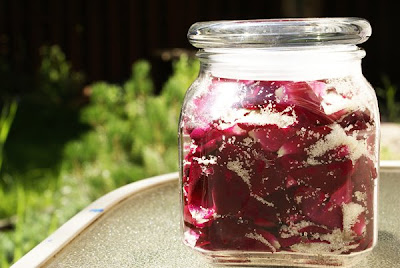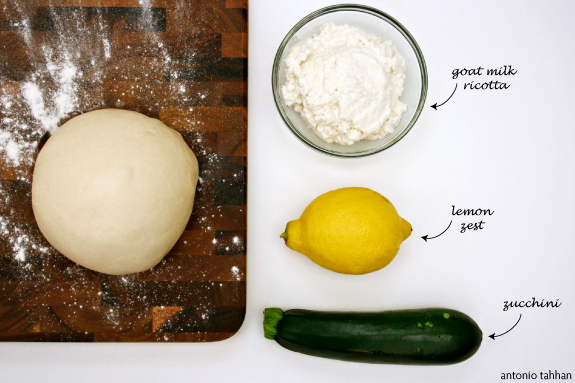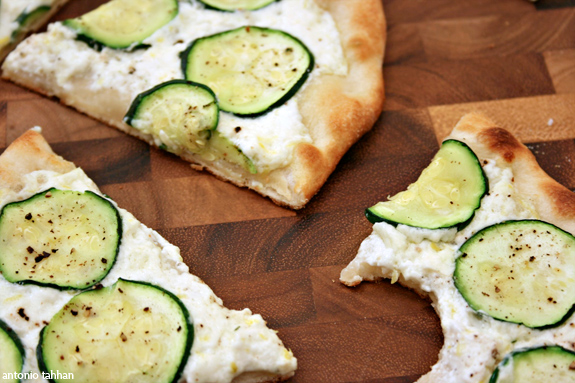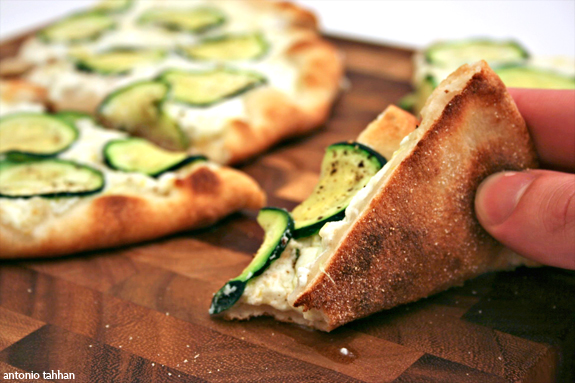Gulkand
Tuesday, June 30, 2009
Posted by Indian Food Rocks
It's no secret that I am a lazy gardener. I prefer to let wildflowers and native grasses rule my yard than spend hours tending to specialty flowers and plants. The few plants that I have brought into my yard are drought-resistant. My neighbor cultivates roses. He has blossoms of various colors on the same bush. Me? I love the wild rose, Rosa woodsii.
It's a treat to see this wild rose in bloom as it lasts for just a day. If I could, I would have a thicket of wild roses to line my property but wilder things would leap over it, so I have abstained from taking it on. I do have a bush of hardy climbing roses that refuses to die. When it didn't bloom one year, I was rather thrilled because I had other plan(t)s for the coveted spot it is in, but it bounced back the following year and blooms profusely late spring through early summer.
If I hadn't been consumed by bed bug bites during late spring last year, I might have noticed my climbing rose bush. This year, I did take notice: the flowers are small but they do have a pleasant fragrance. That, to my mind, translates into essential oils even though this is no damask rose. I figured that these roses might have at least some of the 300 compounds reported to be found in rose oil.
While roses are generally not used in western cuisine, their culinary history can be traced back to Persia. Roses are used as flavoring agents in Middle Eastern as well as Indian cooking. Since I do not have the wherewithal to make rose water or extract rose oil, I decided to do the next best thing: make Gulkand in the sun, now that we have a respite from the incessant rains we have seen this spring. Gulkand is often referred to as rose petal jam but let's please just call it gulkand (Gul-kundh) - gul for rose and kand for sweet.
My first task was to deadhead the bush. Once I had that out of the way, I took stock of the number of buds on the bush to make sure that I would have enough petals to justify making gulkand. Just opened blooms are best for gulkand so it's worth the effort to wake up early to pluck the flowers off the bush.
Remove the petals gently, discarding petals that may be disfigured, have holes or appear to be eaten by insects. Also, discard the rest of the flower. Inspect closely to make sure there are no insects or other creatures that might inadvertently make it into your gulkand, making it not so vegetarian.
Wash the petals several times and lay them out on a wad of paper towels. There is no need to pat them dry as any residual water will simply aid in making the sugar syrup.
In an wide-mouthed jar, make layers of rose petals and sugar, pressing down with a spoon every so often and finishing off with a layer of sugar at the very top. Since my flowers were small, I arrived at the following estimate for a recipe:
3-4 cups of rose petals
3/4 to 1 cup of organic sugar
3 cloves (optional)
seeds of 1 cardamom (optional)
I like the hint of spices in my gulkand so I added cloves and cardamom. Allow this to cook in the sun for at least two weeks. Open it up every other day, not just to get a whiff of the heady fragrance, but to mix it up, too.
This little jar was overflowing when I put the lid on it. It whittled down to just about an inch thick in less than a day. I made two more jars of the same quantity and after a week of being in the sun, I combined them all into this same jar. It's been just over a week and I will update this post with a picture of gulkand as soon as it is ready. Until then, take a look at Anita's Gulkand.
If you have roses that have not been sprayed - please do not use store-bought roses unless you know they are organic and safe for consumption - do give this a try. It's great as a summer activity for kids, too. Which kid doesn't like ripping petals off flowers? They can also take the responsibility for putting the jar out in the sun and bringing it in every day.
Gulkand is supposed to have cooling properties and is best consumed in summer. And, supposedly a host of other benefits for the entire body. My parents sourced the purest and best gulkand for me to help cool my highly myopic eyes and perhaps even deter what genetics had in store for me. I can't say that it worked but I do know that unlike those awful Threptin biscuits that I launched off an 11th floor balcony or that terrible tasting Chyawanprash that followed a trajectory to the ledge under my bedroom window, gulkand made its way safely to my stomach with the spoon being licked clean each time!
This post was written by Manisha
Are you interested in contributing to The Daily Tiffin? Drop us an email: thedailytiffin@gmail.com. We look forward to hearing your ideas.

















